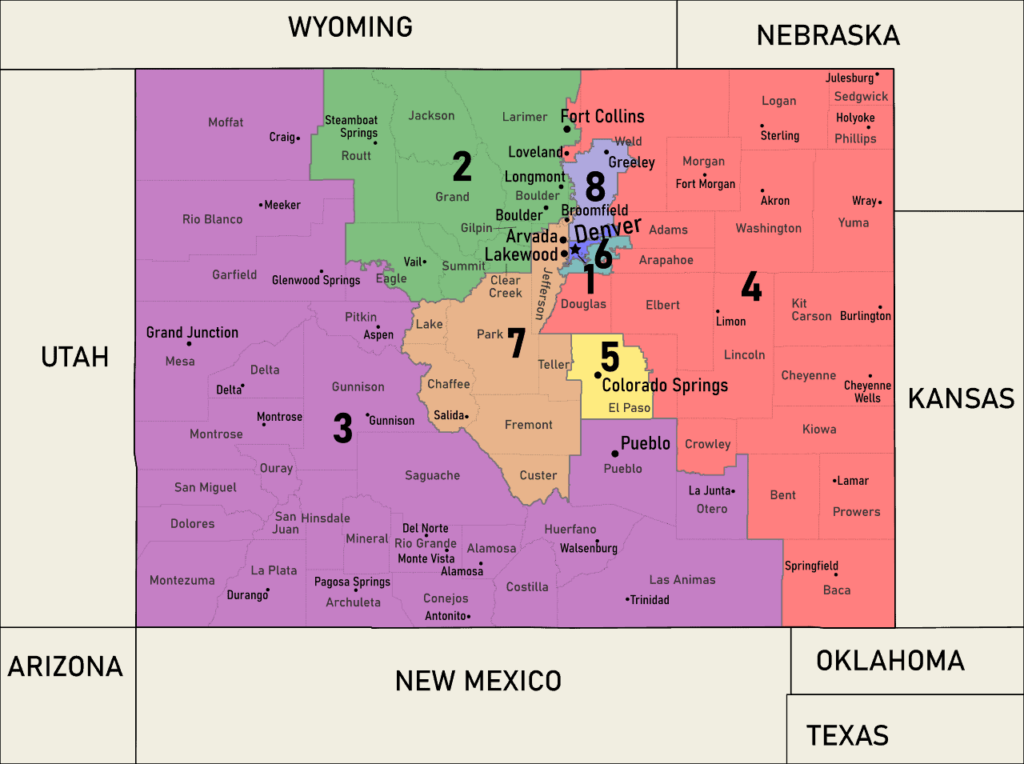
On Monday June 5, the Colorado Democratic Party launched a new campaign to unseat Republican U.S. Rep. Lauren Boebert, who has represented Colorado’s 3rd congressional district since 2021.
The campaign is called Project 546, a reference to the number of votes Rep. Boebert won her seat by in the tightly contested 2022 midterm campaign against Democrat Adam Frisch.
“A lot of Democrats get elected in western and southern Colorado — unfortunately there is one member of Congress who seems to overshadow a lot of the great progress happening in western and southern Colorado, and that is Lauren Boebert,” said Shad Murib, Chair of Colorado’s Democratic Party, on a campaign kickoff call.
Boebert has been widely criticized by liberals for missing key votes in Congress, including the recent vote to raise the debt ceiling. Boebert claimed her absence was in protest, despite video evidence of her running to make the vote.
Democrats on the call repeatedly referenced Boebert’s support for a Republican budget proposal this spring that would have decreased spending on Medicare and Social Security programs.
Since taking office, Rep. Boebert has unsuccessfully introduced bills to limit the government’s ability to acquire public lands, prohibit mask mandates, impeach Joe Biden and Kamala Harris, enhance immigration enforcement at the border, defund Planned Parenthood, and streamline energy permitting to increase U.S. drilling.
Rocky Mountain Values, a political advocacy nonprofit, notes that Boebert has repeatedly voted against bills intended to lower American’s cost of living.
The group highlights Boebert’s vote against the Inflation Reduction Act of 2022, which aims to lower prescription drug and healthcare costs, institute a 15 percent minimum tax on corporations, and incentivize and bolster clean energy programs, among other measures.
Boebert also voted against the 2021 Infrastructure Investment and Jobs Act, which allocated $550 billion for widespread infrastructure and transportation improvements, and the American Rescue Plan of 2021, a wide-ranging $1.9 trillion stimulus bill that instituted tax cuts for workers and the middle class and included funds for Covid-19 safety measures, unemployment benefits, rental assistance, and education spending.
Introducing Project 546
“We’ve all seen what happens when the [Democratic] Party infrastructure writes off rural seats as unwinnable — naturally, we lose,” explains Murib, who outlined a belief that activating a group of potential voters that sat out the 2022 midterms is the key for Democratic success in 2024.
“We know that most of them are young, many of them are women, and nearly half are Latinos. Had these voters turned out like they usually do, Lauren Boebert would be a footnote in Colorado political history,” he argues.
Murib views the absence of those voters — roughly 19,000 Democrats, according to the party’s calculations — as evidence that Democrats have room for improvement in 2024, when voters will take to the polls to vote for president. Meeting those prospective voters where they are begins with understanding their perspective.
“This first phase of the campaign is about aggressively listening,” expands Murib, who says the party intends to increase its overall visibility in advance of local races this November — particularly in historically conservative areas where Democrats have often conceded power in the past.
“We’re making sure that we’re in touch with these communities, and that they know the Democratic Party is here and that we’re caring about the issues that they care about.”
Murib says the campaign has already signed up 25 volunteers 17 months in advance of the November 2024 election and is launching an associated fundraising campaign to fund district-wide organizing efforts.
The campaign’s goal is to contact at least 10,000 voters a minimum of four times before election day via in-person canvassing, phone banks, and text and digital messaging.
“While we’re focused on defeating Lauren Boebert, by organizing this early and with this much capacity we can actually fight in local races across the [3rd] district,” outlines Murib.

Speaking to rural Coloradans
The Democratic Party Chair stresses the importance of understanding the views of rural Coloradans on issues like cost of living, education, healthcare rights, and protecting public lands to Coloradans across the district.
“Lauren Boebert’s attacks on our public schools have to end. Her suggestion of eliminating the Department of Education would decimate Colorado schools that are already strapped for cash and hurt our kids’ ability to get a great education,” said Colorado State Rep. Barbara McLachlan, whose territory spans Archuleta, Gunnison, Hinsdale, La Plata, Ouray, and San Juan counties. “The 546 Project will make sure that every Democrat who might have sat out 2022 is inspired to vote in 2023 and 2024.”
And with climate change jeopardizing the future of Colorado’s water, Democrats stressed the need for the state’s representatives to fight for the future of the region’s water supply.
“Every member of Colorado’s Congressional delegation should be focused on advocating for Colorado’s water, in a nonpartisan way. Water is the lifeblood of our rural communities and the crisis on the Colorado River deserves a unified focus on results, not political posturing or useless tweets,” says State Sen. Dylan Roberts, who represents Colorado’s Senate District 8 and chairs the Senate’s Agriculture and Natural Resources Committee.
“Congresswoman Boebert has voted against important bills that fund water projects in our state,” Roberts says. “Her climate denialism is not helpful in facing this ongoing drought that confronts the Colorado River and the western region.”
He adds that presenting a united front in Congress is critical for Colorado, which must negotiate with larger states with bigger congressional delegations like Arizona and California over the future of the region’s water policy.
More broadly, Boebert’s decision to not hold conventional town halls (although she’s held several telephone town halls since taking office) to hear questions and concerns from constituents has irked many on the other side of the aisle.
“She has been in office three years now, and she has yet to even hold a town hall here,” notes Bri Buentello, a Pueblo resident, former state representative, and Chair of the Pueblo County Democratic Party. “That’s not what Steel City is about.”
“Puebloans know that we believe in hard work, honesty, respect, and in our community,” said Buentello. “The fact of the matter is that we have a Congresswoman who doesn’t share those values.”
She also leveled criticism at Boebert for voting against the 2021 infrastructure bill that included support for domestic steel production, a critical industry for Pueblo.
Over on the western end of Colorado’s 3rd U.S House district, fellow Democrats tell a similar story about Boebert.
“I encountered a lot of people who normally would vote a straight Republican ticket,” says Sen. Roberts of his personal experience in towns like Craig and Meeker, where some residents are fed up with Boebert’s lack of support for agricultural and rural communities.
Previewing The 2024 race
As Democrats turn their attention to 2024, Adam Frisch, the former Aspen city councilman turned Democratic house challenger who lost to Boebert by less than 600 votes in 2022, announced he will run again back in February.
At this early stage, Frisch is the presumptive frontrunner to face Boebert. Sol Sandoval, who lost a tight primary to Frisch in 2022 by less than 300 votes, recently announced she will not run in 2024.
Through the end of March 2023, Frisch’s nascent campaign generated more than $1.7 million, compared to Boebert’s $764,000. In their 2022 race, the pair raised more than $14 million, far and away the most expensive house race in Colorado during that cycle.
In a Colorado Sun article back in March, Frisch acknowledged that the 2024 race will come with its own challenges — a lack of surprise, predominantly, that will allow incumbent Boebert time to bolster her legislative record and tap into the GOP’s fundraising base ahead of election day.
But Frisch’s increased name recognition, strong initial fundraising, and early entrance into the race could all play to his advantage as he prepares for a potential second showdown with Rep. Boebert in November 2024.
Still, Colorado’s 3rd district, redrawn in the fall of 2021 post-census, has leaned heavily red in recent times. The last Democrat to hold office was John Salazar, who held office from 2005 to 2011 before being defeated by Scott Tipton, who went on to serve a decade in the house before his surprising primary loss to Boebert in 2020.
But Colorado Democrats are confident that their head start will enable them to activate high turnout in 2024 and post a strong showing in local elections along the way — perhaps even flipping seats in traditionally conservative enclaves within Boebert’s house district.
“We can never win in the red areas of the state if we don’t compete. And we can’t compete if we don’t understand the issues these folks care about,” says Murib. “When we actually speak the language of rural Coloradans and fight for things that matter to them, we win.”

